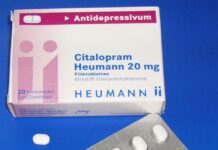Coyne Covers Citalopram Controversy
In his “Mind the Brain” blog for PLOS, well-known researcher James Coyne reviews the controversy surrounding the latest case of a fraudulently reported study...
Review Links Antipsychotics with Risk for Heart Attacks
A systematic review published this week in the British Journal of Clinical Pharmacology found that patients taking antipsychotic drugs were at nearly twice the risk...
“Why We Shouldn’t Trade a Weakened FDA for More Medical Research Funds”
Ed Silverman at STAT reports that Congress has linked increased research funding to “fast-track” approval procedures. “By linking the extra funds to speedier approvals,...
“Does Health Journalism Do More Harm Than Good?”
One of the consultants for John Oliver’s latest takedown on science reporting and health journalism was Gary Schwitzer, publisher of Health News Review. In...
“The Unfulfilled Promise of the Antidepressant Medications”
A new article in The Medical Journal of Australia laments that, while antidepressant use continues to climb, the research evidence shows that their effectiveness...
Childhood Trauma Predicts Lack of Response to Antidepressants
Research in Translational Psychiatry finds that childhood maltreatment and trauma predict a greater likelihood of developing chronic depression, and a reduced likelihood of responding to treatment...
Interview: Researchers Deconstruct Ghostwritten Industry Trial for Antidepressant
Researchers, Jon Jureidini, Jay Amsterdam and Leemon McHenry, have taken a closer look at the data from a randomized control trial of citalopram (Celexa) that was ghostwritten and then used by the manufacturers to support claims of the drug’s efficacy and safety in the treatment of child and adolescent depression. To get the background on this story, we connected with Dr. Leemon McHenry, an investigator in this study and a lecturer in philosophy at California State University, Northridge.
Report from the Parliament: Can Psychiatry At Least Be Curious?
In the past six years, I have had the opportunity to speak at several conferences or meetings that I felt had particular potential to stir some political activity that would challenge current psychiatric practices, and one of those events was the meeting convened in the U.K.’s Parliament on May 11th, which had this title for the day: Rising Prescriptions, Rising Mental Health Disability: Is There a Link?
Antidepressants Do Not Prevent Suicides, May Increase Risk
When the CDC released data revealing an increasing suicide rate in the US, some experts, speaking to major media outlets, speculated that the increase...
NIH Hospital Made Patient Safety ‘Subservient to Research’
A Washington-Post exclusive reveals that that the leadership of the flagship hospital of the National Institute of Health (NIH) is being restructured after a...
“Public Wary of Faster Approvals of New Drugs, STAT-Harvard Poll Finds”
According to a new STAT-Harvard poll, the majority of Americans oppose new legislation that would speed up the approval of new drugs and medical...
Psych Patients Who Resist Stigma Do Better
A new study in press in the Journal of Schizophrenia Research finds that patients who actively resist the negative stigma associated with mental health...
Olanzapine Can Cause Serious Skin Reaction, FDA Warns
The US FDA has issued a new warning for the atypical antipsychotic Olanzapine, also known by the brand names Zyprexa and Symbyax. The agency...
“Politicians and Experts Meet at Parliament to Explore Record Antidepressant Prescribing and Disability”
The All-Party Parliamentary Group for Prescribed Drug Dependence is meeting today, May 11th, to discuss evidence of the link between the rise in disability...
“fMRI and False Positives: A Basic Flaw?”
For Discover Magazine, Neuroskeptic covers the pioneering work of Anders Eklund, which points to flaws in the analysis of psychiatric and neurological research using...
“Another Study Finds Link Between Pharma Money and Brand-name Prescribing”
New findings from Harvard Medical School reveal that Pharma industry payments to physicians in Massachusetts are associated with higher rates of prescribing brand-name drugs that treat...
“‘You Want a Description of Hell?’ OxyContin’s 12-Hour Problem”
A new LA Times investigation finds that Purdue Pharma’s claims that OxyContin, a chemical cousin of heroin, could relieve pain for twelve hours led some...
FDA Warns About New Impulse-Control Problems Associated With Abilify
Yesterday, the US Food and Drug Administration (FDA) released a warning that the antipsychotic drug aripiprazole or Abilify is associated with compulsive and uncontrollable...
Restoring Study 329: Letter to BMJ
When we set out to restore GSK’s misreported Study 329 of paroxetine for adolescent depression under the RIAT initiative, we had no idea of the magnitude of the task we were undertaking. After almost a year, we were relieved to finally complete a draft and submit it to the BMJ, who had earlier indicated an interest in publishing our restoration. But that was the beginning of another year of peer review that we believed went beyond enhancing our paper and became rather an interrogation of our honesty and integrity. Frankly, we were offended that our work was subject to such checks when papers submitted by pharmaceutical companies with fraud convictions are not.
Group Mindfulness Shows Promise Reducing Depression Associated with Hearing Voices
A new study out of Kings College London found that twelve sessions of a group mindfulness-based therapy relieved distress associated with hearing voices while reducing depression over the long-term. The person-based cognitive therapy (PBCT) intervention had significant effects on depression, voice distress, voice controllability and overall recovery.
“Depression Relapse Prevention with Mindfulness Therapy ‘On Par’ with Drugs, Review Shows”
A new review finds that mindfulness-based cognitive therapy (MBCT) can help stave off recurring depression as effectively as antidepressants. People suffering from depression who...
Lancet Editorial Points to “Trouble with Psychiatry Trials”
While clinical trials make up the “bedrock of evidence-based medicine” in other specialties, psychiatry faces a number of both ethical and scientific problems related to its use of randomized control trials. According to a new editorial in The Lancet Psychiatry, the field of psychiatry research has particular problems with ethical issues in recruitment, inaccurate classification systems, and controversial placebo comparisons, and then, once the studies are finished, it often remains unclear what the “outcomes actually mean for people’s lives.”
Mental Health Documentary “Healing Voices” Premiers Across 130 Communities in 8 Countries
The producers of “Healing Voices” ‐ a new social action documentary about mental health ‐ are releasing the film via community screening partners in...
“What Drug Ads Don’t Say”
For the New York Times, Cornell psychiatrist Richard Friedman proposes new regulations to make direct-to-consumer drug ads reveal the relative price and effectiveness information that...
Intensive Care Patients at High Risk for PTSD, Psychiatric Symptoms
People who survive life-threatening illnesses in the intensive care unit (ICU) of a hospital are at high risk for depression and anxiety and nearly...











